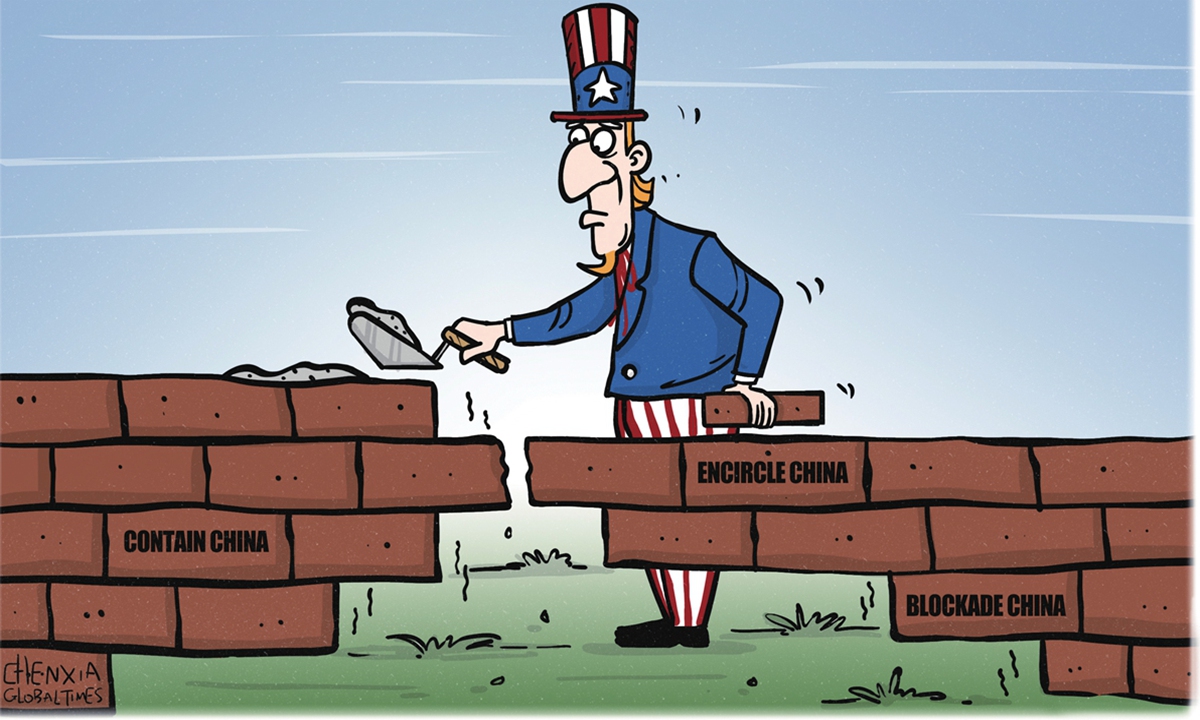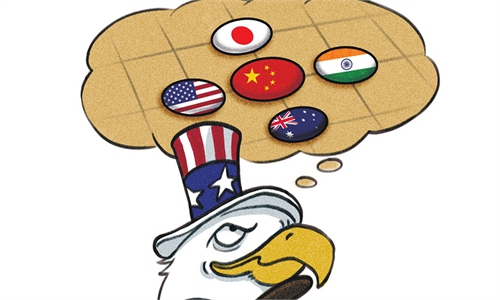
Illustration: Chen Xia/GT
US Secretary of State Antony Blinken, Australian Foreign Minister Penny Wong and Japanese Foreign Minister Yoshimasa Hayashi released a statement on Friday amid the 55th ASEAN Foreign Ministers' Meeting, urging China to "immediately cease the military exercises" in the Taiwan Straits.
After the G7 foreign ministers' statement on the Taiwan question, it's not surprising that the Quad countries would jointly release a statement over the situation across the Taiwan Straits, since the US has worked in recent years to elevate the Quad mechanism and increase the consistency of member countries regarding major issues of concern to the US.
However, India, a key member of Quad, is absent from this statement. Internationally, after the US provoked tensions in the Taiwan Straits, most countries did not follow the US on this issue. We can find two essential features if we examine the two statements released by foreign ministers of G7 and those of the US, Australia and Japan.
First, both of them are far from admitting that Nancy Pelosi's illicit visit to the island of Taiwan is responsible for the situation, yet condemn China's countermeasures for "raising tensions and destabilizing the region." Second, both statements reiterate that "there is no change in the respective one-China policies." This mirrors that Western governments are well aware that Pelosi's visit has seriously challenged the one-China principle, which has led to the current situation. Therefore, they have to reiterate the one-China principle when they smear and condemn China. It is easy to understand why besides a few certain countries, most countries in the world do not follow the US in terms of the Taiwan question. They know that the crisis in the Taiwan Straits stems from the US.
Apart from issues that concern China's core interests, India's stance differs from that of the rest three Quad members in many other areas. This grouping which was pieced together as a matter of expediency faces a great deal of uncertainties in front of many sharp and sensitive international issues. In matters of low sensitivity, the four countries share common grounds for cooperation, while in major international issues that concern the core interests of major powers, the four can hardly speak in one tune and Japan, Australia and India can hardly act as the US demands. In fact, the tunes of the so-called G7 statement, and the US-Japan-Australia statement, are different from the White House's version. US allies have their own calculations based on their own interests.
Therefore, when Washington is coordinating with its allies and partners on US-dominated multilateral platforms, it cannot expect all countries to completely repeat its line. Not to mention that when it comes to India, a country traditionally pursuing non-aligned posture, the US and its allies may not be able to tie India to their chariot on the Taiwan question.
Additionally, the possible candidates of the Quad Plus are far from unconditional supporters of the US. South Korea, one of the potential members, has displayed much enthusiasm for cooperating with the US' Indo-Pacific Strategy. However, when Pelosi departed Taipei for South Korea during her Asia trip, President Yoon Suk-yeol, who was in Seoul, avoided a meeting with her as "his vacation schedule coincides with [Pelosi's] visit." Yoon was quite aware that Pelosi's Taiwan visit essentially aimed at incorporating the Taiwan question into the US Indo-Pacific Strategy. As a result, Yoon chose not to be tied with the US interests in terms of its Taiwan policies after Pelosi's visit to the island. Such strategic consideration determines that even if Seoul would join the Quad Plus, it will not blindly follow the US on issues involving China's core interests.
To be objective, the US Indo-Pacific Strategy to some extent accommodates the demands of some regional countries, while there are also parts of the strategy that conflict with the interests of countries concerned, especially when it comes to China-related issues. The US is promoting the strategy to establish its hegemony in the Indo-Pacific region, as it is the most significant area around the globe in the 21st century. The reason why containing China has become the top priority of the US strategy is that Washington has made one of the most dreadful strategic misjudgments about China - supposing that the country aims to compete with the US for the so-called leadership of this region, which is absolutely not what China pursues.
The US Indo-Pacific Strategy faces a complicated situation: on the one hand, regional countries follow the US in terms of the strategy on certain issues; on the other hand, they obviously have their own considerations when it comes to containing China.
The US desires to see other countries choose sides between China and itself, which, however, is avoided by the vast majority of countries in all sorts of ways. There will be more divisions and differences among the US and its allies or partners if it continues to put more efforts on containing China. On the contrary, the more the US reduces its misjudgements and takes an objective stance on China, the more it may be trusted by its allies and partners.
The author is a senior research fellow at the China Institute of International Studies. opinion@globaltimes.com.cn

